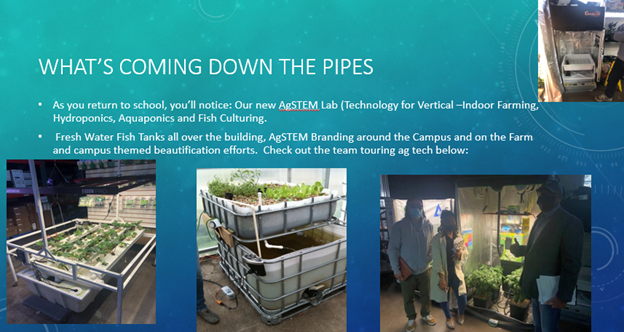


BOOKER T. WASHINGTON HIGH SCHOOL
Standard 16: Program Evaluation
STEM K12 16: School/program conducts evaluative activities to ensure the effectiveness of STEM implementation.
Our Story
Washington High school has annual STEM advisory board meetings in which our stakeholders meet and give feedback regarding our STEM program. In addition, our school hosts several cluster meetings throughout the school year to evaluate our STEM program alignment with our feeder schools. This is imperative to improve the quality of our neighborhood schools. Our cluster teams include teachers, administrators, support staff, students, parents and community members. The cluster model allows us to provide more support, opportunity and equity, as well as creates strategies that increase student performance. At these meetings we discuss student achievement, pathway offerings, staffing needs for STEM instruction, as well as STEM enrichment opportunities for students.
We also use these meetings to evaluate how we are supporting STEM instruction as students transition from middle school to high school. Due to much feedback from our cluster and stakeholder meetings many revisions have been implemented to ensure the courses, internship opportunities, and STEM access to all students is rigorous and equitable. Most recently we saw the need to do more reflecting upon our STEM curriculum and instructional methods. So we decided that it would be in our best interest to survey the faculty to gauge their overall attitude in regards to STEM initiatives. The survey of the teachers addressed the current understanding of the STEM process, positives and negatives of implementation, and the number of STEM experiences teachers provide their students. The results showed that 53% of the faculty provided more experiences currently than in recent years.
Opportunities for Growth
We do recognize the need to plan appropriate professional development to address the areas of concerns and focus on STEM instructional practices. We also want to ensure we have a greater social media presence to ensure all stakeholders stay up to date and knowledgeable regarding our STEM success and revisions toward improvement.
Initiatives/Actions
Curriculum Planning Partners
Curriculum Planning Sessions with coordinators from Atlanta Botanical Garden, Georgia Aquarium, Greenleaf, and University of Georgia
Students participating in the Booker T. Washington High School STEM program will engage the in the agriculture industry utilizing the experiential learning model. Through connected partnerships, students will matriculate through the program from conception through construction. A distinct characteristic of the program is the intentional infusion of industry experts to support the learning experiences. Industry experts will serve as our educational partners and lead lessons and experiences that increase student proficiency levels. In addition, all Booker T. Washington students will earn the Ga State offered CTAE Pathway completion certification in Agriculture of Aquaculture Leadership with the option available to dually certify in Agribuisness. Our educational partners will influence the following courses through projects or lessons connected to the course learning objectives.

GO Team
GO Teams work with school leadership and the community to help determine the long term direction of the school, design innovative solutions to increase student achievement, and serve as school ambassadors to the local community. This means that parents, educators and community members now share in the decision-making process by joining the school’s GO Team .


.png)
Strategic Plan
MOU with Westside Future Fund
Rubric-Self-Assessment Evaluation



